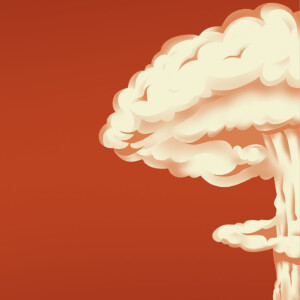
Friday Sep 08, 2023
The Atomic Aftermath: Surviving Hiroshima
Chapter 1:What is Hiroshima about
Hiroshima by John Hersey is a non-fiction book that details the experiences of six survivors in the aftermath of the atomic bombing of Hiroshima, Japan, in 1945. The book was first published as a lengthy article in The New Yorker in 1946 and later expanded into a full-length book. It provides a detailed account of the events leading up to the bombing, the immediate impact of the explosion, and the long-lasting physical and emotional effects on the survivors.
Hersey focuses on the personal stories of six individuals who lived through the devastation, including doctors, nurses, and ordinary citizens. He explores their courageous efforts to cope with the immediate aftermath, their struggles with injuries and radiation sickness, and the emotional trauma experienced by each survivor. The book also delves into the broader context of the bombing, including the political climate, military strategy, and the overall devastation caused by the atomic bomb.
Hiroshima is a powerful and haunting account of the human suffering caused by the atomic bombing. It aims to provide a firsthand perspective on the consequences of nuclear weapons and the importance of understanding the human impact of such catastrophic events.
Chapter 2:Author of Hiroshima
John Hersey was an American author and journalist, best known for his compelling and influential work "Hiroshima." Born on June 17, 1914, in Tientsin, China, Hersey attended Yale University and later pursued a career in writing.
During World War II, Hersey worked as a war correspondent, covering various events across Europe, the Pacific, and Asia. However, it was his groundbreaking book "Hiroshima" that propelled him to literary fame. Published in 1946, a year after the atomic bombing of Hiroshima, the book offers a detailed and personal account of the experiences of six survivors from different walks of life.
Hersey's meticulous research and ability to bring the survivors' stories to life revolutionized the way people viewed the atomic bomb and its long-lasting effects. The book became a masterpiece of narrative reporting and has been widely recognized for its humanistic approach to a catastrophic event.
John Hersey's "Hiroshima" remains one of the most important works of 20th-century literature, exposing the horrors of nuclear warfare and advocating for peace. Hersey continued his writing career, producing numerous novels, essays, and works of non-fiction. He passed away on March 24, 1993, but his legacy as a compassionate and thought-provoking author lives on.
Chapter 3:Why is Hiroshima worth reading
"Hiroshima" by John Hersey is worth reading for several reasons:
- Vivid portrayal of the human experience: The book masterfully captures the horrific aftermath of the atomic bombing of Hiroshima, offering in-depth accounts of the experiences of six survivors. Through their stories, the book provides a human face to the devastating event, evoking profound empathy and understanding for the victims.
- Historical significance: The bombing of Hiroshima was a turning point in world history, ushering in the nuclear age and forever changing the landscape of warfare. By detailing the immediate aftermath and long-term effects on the survivors, "Hiroshima" provides a crucial historical documentation of the event, ensuring that the world does not forget the catastrophic consequences of nuclear weapons.
- Ethical considerations: The book prompts readers to grapple with the moral implications of using atomic weapons, exploring questions of responsibility and the human cost of warfare. It raises important ethical debates and challenges readers to reflect on the potential consequences of their actions.
- Engaging storytelling: Hersey's style of storytelling is compelling and captivating. He presents the survivors' stories in a straightforward, journalistic manner, making the book accessible to a wide range of readers. The narrative flow keeps readers engaged, while the individual accounts illuminate various aspects of the bombing and its aftermath.
- Social and cultural impact: "Hiroshima" played a significant role in shaping public opinion and discourse on the atomic bombing. It exposed the harsh reality of nuclear warfare to a wider audience, catalyzing discussions about the use of atomic weapons and their implications. The book sparked important conversations surrounding war, peace, and humanitarian concerns.
Overall, "Hiroshima" offers a poignant and deeply moving portrayal of one of the darkest moments in human history. It is a powerful reminder of the human capacity for resilience,
No comments yet. Be the first to say something!